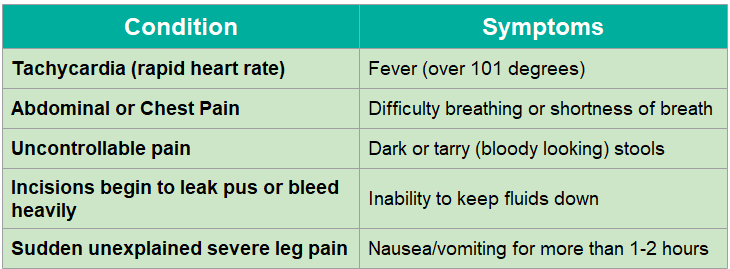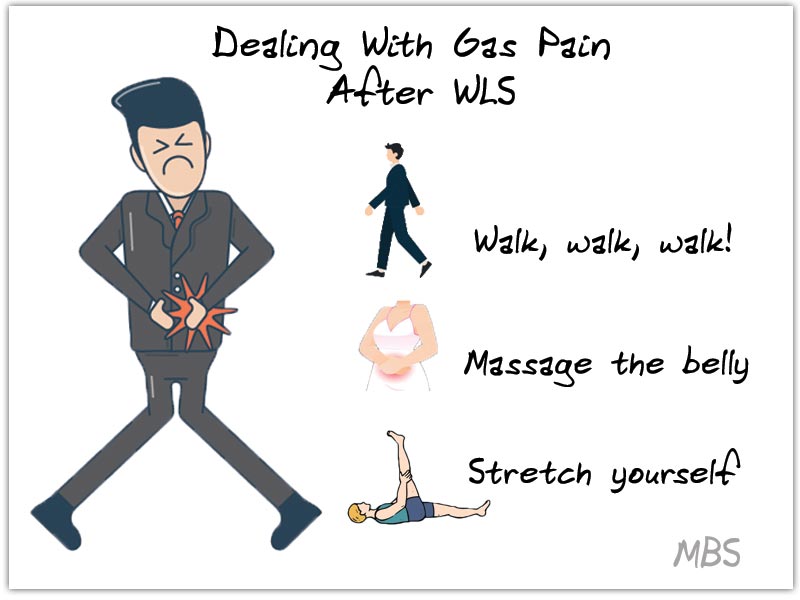Week 1 Post-Op Bariatric Surgery Instructions
Medically Reviewed by Katelyn J. Mock, US-Registered Dietician (R.D.)
The most important thing to focus on is getting enough fluids to stay hydrated. Dehydration is the most common reason for people being re-admitted to the hospital after a weight loss procedure.
Have at least 64 oz of fluids a day.
Common Signs & Symptoms of Dehydration
- Thirst
- Headache
- Hard stools
- Dizziness upon sitting or standing up
How to Stay Hydrated?
- If you are unable to stay hydrated or keep fluids down, it is important to go to your primary doctor’s office for an evaluation or visit the emergency room for IV fluids.[1]Life After Bariatric Surgery. ASMBS.
View in Article - Make a goal of consuming 64oz or more of sugar-free, decaf fluids daily. That is eight cups of water, tea, milk, decaf coffee, a protein drink, or a low sugar beverage.
- To make it easier to keep track of your fluids, use a cup with ounces or milliliters labeled on it.
- Drink even when you are not thirsty taking 1/2 teaspoon size sips every few minutes.
- You call tell if you are well-hydrated by the color of your urine and how frequently you are going to the bathroom. Ideally, it should be light yellow to clear in color and you should be urinating 5-10 times each day.[1]Life After Bariatric Surgery. ASMBS.
View in Article
However, it is still recommended to avoid caffeine for 30 days post-op due to the sensitivity of the stomach, as per the ASMBS (American Society for Metabolic and Bariatric Surgery.[1]Life After Bariatric Surgery. ASMBS.
View in Article)
How to Spot Complications?
It is important to know about potentially life-threatening complications and how to spot the signs and symptoms.
The most common major complications are pulmonary embolism and gastric leak from the internal staple line or anastomosis.
Below, are signs for when to call your doctor or if severe enough, go to the emergency room.[2]Huff, Charlotte. Red flags for bariatric surgery complications. ACH Hospitalist.
View in Article

There are some common aches and pains that many people experience after surgery and are completely normal.
If you are experiencing pain on the right side of your abdomen, this is likely related to the largest incision made during the surgery.
Experiencing Gas Pain?
Pain in your left shoulder is frequently related to the gas, carbon dioxide, they use during surgery.

If you are noticing gas pain in your shoulder or other parts of your body, particularly in your abdomen, here are some general tips.
- First, walk, and then walk some more! This not only helps get that gas moving out of your body but also helps prevent blood clots.
- Another tip is to gently massage your stomach and move your hands from the right side, up toward your chest and then down the left side of your stomach.
- Doing gentle stretches on your back and lifting and bending your legs at the knee and hip can also help relieve some of that discomfort.[3]How to Get Rid of Gas After Surgery. The James at The Ohio State University Wexner Medical Center.
View in Article - Remember to avoid aspirin and non-steroid inflammatory drugs (NSAIDs) after surgery, as they can increase your risk of bleeding. Medications to avoid include Advil, Aleve, Motrin, and Ibuprofen.
- It is generally considered safe to take Tylenol for mild headaches and other aches and pains. Always contact your physician before taking any medication.
The first week can be quite overwhelming for some patients. You are trying to adjust to your new “stomach,” feeling sore from the surgery itself, traveling, and potentially going back to work. Try to take everything day by day and know that things will get easier in time.
The Facebook Support Group is a great place to get tips from other patients that have been in your shoes.
It is normal to have some weakness in the first few weeks after surgery and to tire quickly, but it is still important to walk, walk, walk to help prevent blood clots.
As for other physical activity, use caution and avoid lifting anything over 10lbs (a gallon of milk is 8lbs). You will also want to avoid strenuous pushing or pulling motions such as vacuuming or moving heavy objects.
References:
- Life After Bariatric Surgery. ASMBS.
- Huff, Charlotte. Red flags for bariatric surgery complications. ACH Hospitalist.
- How to Get Rid of Gas After Surgery. The James at The Ohio State University Wexner Medical Center.

